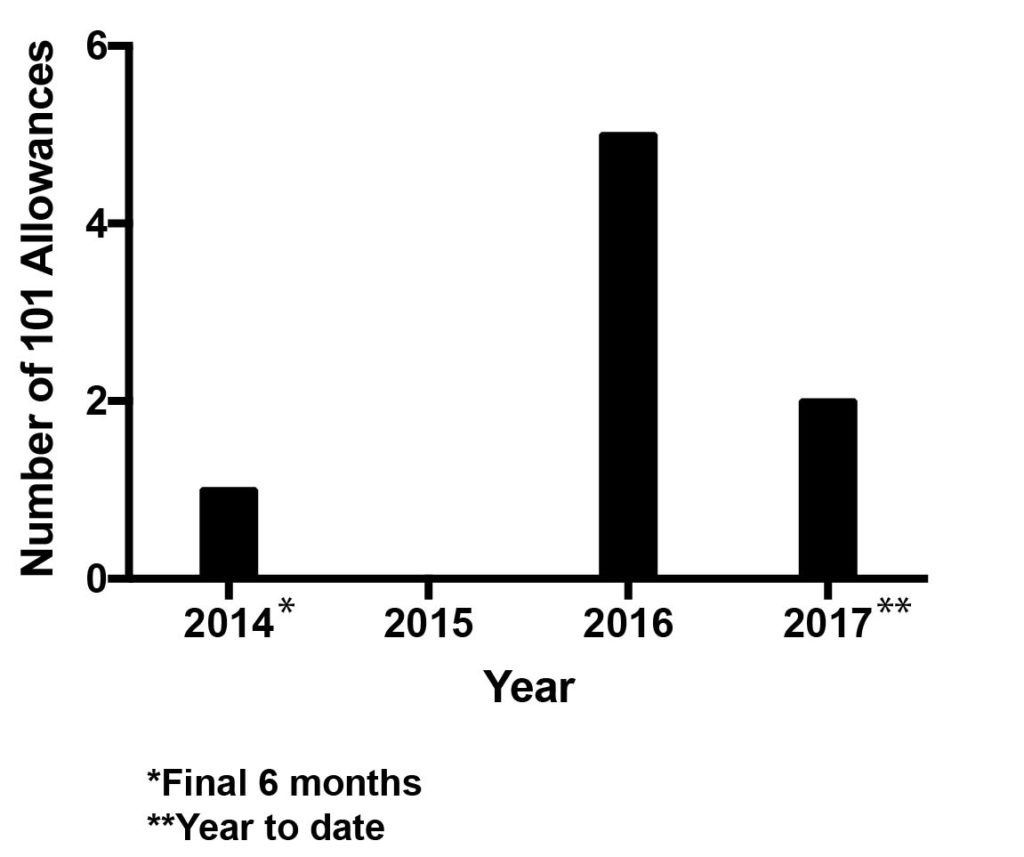Turning the Tide: Patent Subject Matter Eligibility at the Federal Circuit
May 24th, 2017 by Nicholas Vincent | News | Recent News & Articles |
 Recent decisions from the United States Court of Appeals for the Federal Circuit from 2016 and 2017 suggest a loosening grip and increasing flexibility of the two-part Mayo/Alice framework that has dominated the question of patent subject matter eligibility under 35 U.S.C. § 101. In fact, in 2014 after the Alice decision, just one Federal Circuit case addressing 101 challenges was ruled to have eligible claims. Although there were no 101 eligibility affirmations in 2015, there were five such cases in 2016 alone. Fewer than five months into 2017, there have now already been two 101 decisions from the Federal Circuit finding patent eligible claims (see Figure 1 and Table 1).
Recent decisions from the United States Court of Appeals for the Federal Circuit from 2016 and 2017 suggest a loosening grip and increasing flexibility of the two-part Mayo/Alice framework that has dominated the question of patent subject matter eligibility under 35 U.S.C. § 101. In fact, in 2014 after the Alice decision, just one Federal Circuit case addressing 101 challenges was ruled to have eligible claims. Although there were no 101 eligibility affirmations in 2015, there were five such cases in 2016 alone. Fewer than five months into 2017, there have now already been two 101 decisions from the Federal Circuit finding patent eligible claims (see Figure 1 and Table 1).
The Mayo/Alice test originates from two landmark Supreme Court decisions in 2012 and 2014: Mayo Collaborative Services v. Prometheus Laboratories, Inc. and Alice Corporation Pty. Ltd. v. CLS Bank International. In Mayo, the Supreme Court ruled that diagnostic methods are not patentable subject matter. In Alice, a case that held that computer implementation of an abstract idea does not transform it into a patent-eligible invention, the Supreme Court used the framework established in Mayo and integrated it into a single test to determine the patent eligibility of traditionally patent-ineligible subject matter, or “judicial exceptions.” These exceptions, under 35 U.S.C. § 101, are abstract ideas, laws of nature, and natural phenomena. The Mayo/Alice test is a two part test that serves to address the patent eligibility of claims directed towards these exceptions, first asking whether the claims are “directed to” one of the exceptions in in the first step, and then asking whether the claims recite additional elements that amount to “significantly more,” taking them outside the exception.
The Mayo/Alice framework has had what many would describe as unfavorable consequences on the patent eligibility of many claims in the computer software and biotech areas. In fact, DDR Holdings, LLC v. Hotels.com L.P., decided in December 2014 by the Federal Circuit, remained the sole Federal Circuit case wherein the claims in question were found to be patent eligible under the Alice framework until mid-2016, when the court ruled on several cases involving subject matter eligibility and 101 challenges. The vast majority of these cases (listed in Table 1) are related to software and technology, and all focus on an improvement over the prior art. These rulings represented an incredible increase in the patent eligibility of 101 challenges over previous years. In fact, five cases had claims that were deemed to be patent eligible in 2016, whereas DRR Holdings was the only case to have claims that were deemed patent eligible by the Federal Circuit between 2014 and 2015. Also amongst those cases finding in favor of patent subject matter eligibility was an important one from the biotech area, Rapid Litigation Management Ltd. v. CellzDirect, Inc. This year alone, there have already been two cases (Thales Visionix Inc. v U.S. and Trading Technologies v. CQG) decided by the Federal Circuit related to 101 with patent-eligible claims.
Since mid-2016, the Federal Circuit has shown a willingness to loosen the grip of the Mayo/Alice framework and to apply it in more effective ways, even as the Supreme Court has declined opportunities to rule on the issue of 101 challenges and subject matter eligibility. Most explicitly, the Court denied a petition for certiorari in Sequenom, Inc. v. Ariosa Diagnostics, Inc. in June 2016, despite a series of over 20 amicus briefs filed between April and May. As the Federal Circuit continues to act on 101 challenges, it seems plausible to posit that the Court sees an expanding role for itself in hearing these challenges.
35 U.S.C. § 101 eligibility affirmations from 2014-present.
Table 1: Federal Circuit Cases with 101 Allowances (2014-present)
| Case | Date |
| DDR Holdings, LLC v. Hotels.com, L.P. | December 5, 2014 |
| Enfish, LLC v. Microsoft Corp. | May 12, 2016 |
| Bascom Glob. Internet Servs., Inc. v. AT&T Mobility LLC | June 27, 2016 |
| Rapid Litig. Mgmt. Ltd. V. CellzDirect, Inc. | July 5, 2016 |
| McRo, Inc. v. Bandai Namco Games America, Inc. | September 13, 2016 |
| Amdocs (Israel) Limited v. Openet Telecom., Inc. | November 1, 2016 |
| Trading Technologies v. CQG | January 18, 2017 |
| Thales Visionix Inc., v. U.S. | March 8, 2017 |
– Nicholas Vincent and Anthony D. Sabatelli, PhD, JD
This article is for informational purposes, is not intended to constitute legal advice, and may be considered advertising under applicable state laws. The opinions expressed in this article are those of the author only and are not necessarily shared by Dilworth IP, its other attorneys, agents, or staff, or its clients.


